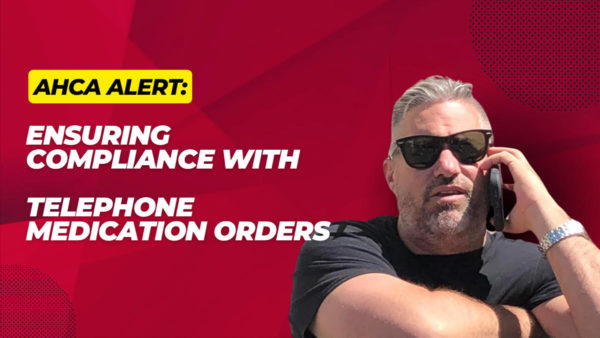
AHCA Alert: Ensuring Compliance with Telephone Medication Orders
Understanding Medication Practices: Regulation 59A-36.008 on Medication Labeling and Orders
In the complex environment of assisted living facilities (ALFs), proper medication management is crucial to ensuring resident safety and compliance with state regulations. One important aspect of this is the handling of medication orders, particularly when these orders are communicated verbally, such as by telephone. Florida’s regulation 59A-36.008 provides clear guidelines to ensure that these practices are carried out safely and effectively.
Medication Orders by Telephone
Under section (7)(e) of the regulation, it is permissible for a nurse to take a medication order over the phone from a licensed health care provider. This flexibility is vital in situations where immediate changes to a resident’s medication regimen are necessary, such as after a sudden health development or a change in the resident’s condition.
However, with this flexibility comes a responsibility to ensure that the verbal order is properly documented and confirmed to prevent any errors in medication administration.
Documentation of the Telephone Order
Once a nurse receives a telephone medication order, it is essential that the order is promptly documented in the resident’s Medication Observation Record (MOR). The MOR serves as a critical tool in tracking all medications administered to the resident, ensuring accuracy and continuity of care. Immediate documentation helps prevent any confusion or miscommunication that could arise from a delay.
Obtaining Written Confirmation
While a verbal order allows for timely intervention, it is not a substitute for a written medication order. The regulation mandates that the facility must obtain a written medication order from the health care provider within 10 working days of the telephone order. This written confirmation serves as the official documentation and should be incorporated into the resident’s medical records.
It’s important to note that the regulation allows for flexibility in how this written confirmation is received. A faxed or electronic copy of the signed order is considered acceptable, which can expedite the process and ensure that the facility remains compliant without unnecessary delays.
Key Takeaways for Compliance
1.Prompt Documentation: As soon as a telephone order is received, it must be documented in the resident’s Medication Observation Record to ensure that all staff are aware of the order and can administer the medication correctly.
2. Obtain Written Orders: The facility must secure a written order from the healthcare provider within 10 working days. A faxed or electronic copy is acceptable, providing convenience and efficiency.
3. Maintain Records: Ensuring that all medication orders, whether verbal or written, are properly documented and stored is crucial for compliance and resident safety.
By adhering to these regulations, ALFs can maintain a high standard of care and ensure that all medication practices are safe, accurate, and compliant with Florida law. Proper medication management is not only a regulatory requirement but also a key aspect of providing quality care to residents.
